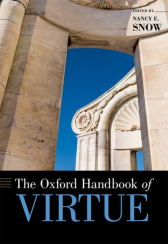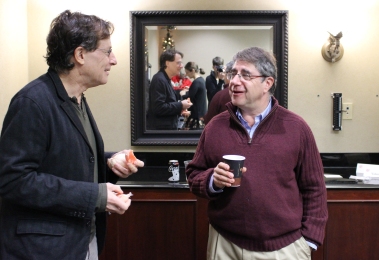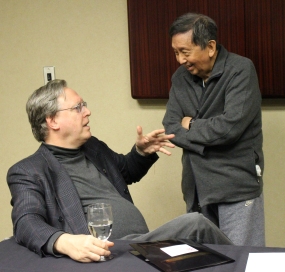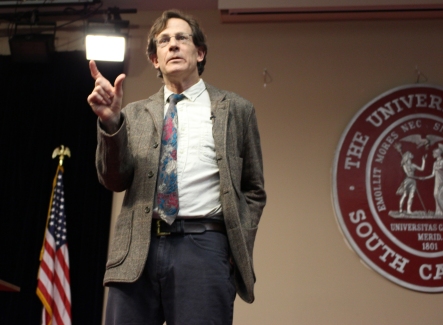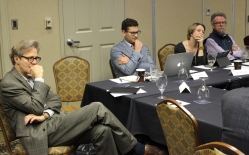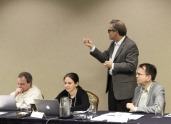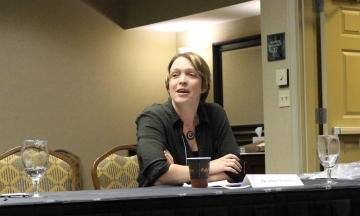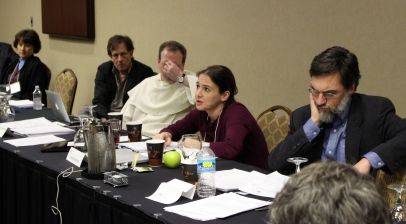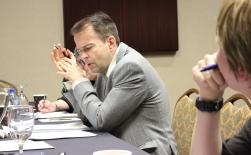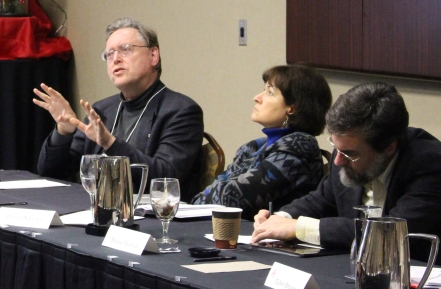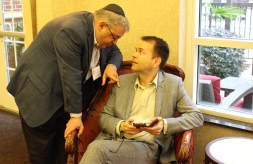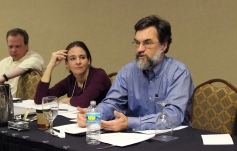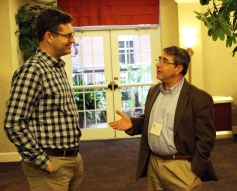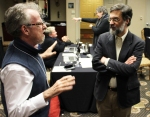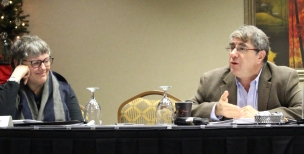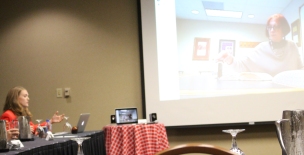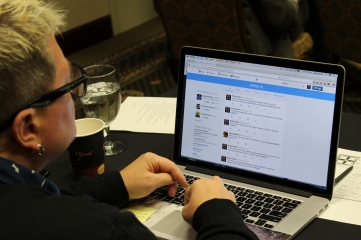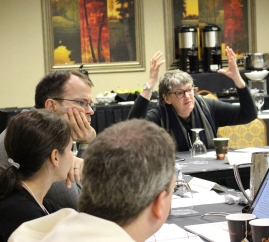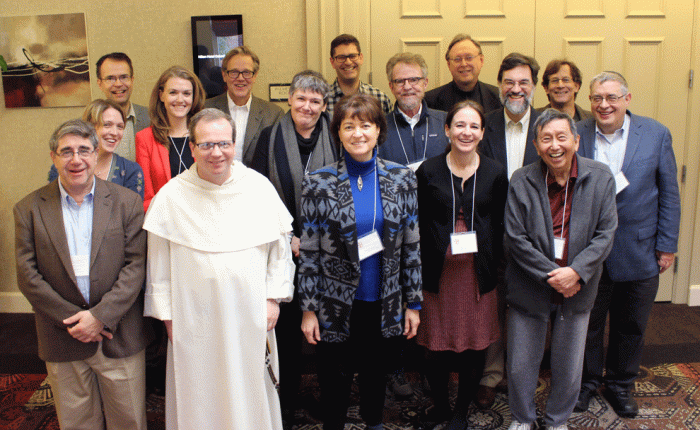
Paul T.P. Wong is Professor Emeritus, Trent University, and a scholar with Virtue, Happiness, & the Meaning of Life. Timothy Reilly is a Postdoctoral Fellow in the Developing Virtues in the Practice of Science Project at the University of Notre Dame, and was a participant in our 2017 Summer Seminar, Virtue, Happiness, and Self-Transcendence.
This post is part 1 of a 2-part series.
Introduction
The main thesis in this presentation is that Viktor Frankl’s self-transcendence (ST) model provides a useful ethical framework for living and behaving well. We also argue that his model is consistent with the Aristotelian and Thomistic moral theory of virtue ethics in important ways (Hursthouse & Pettigrove, 2016).
Virtue is an important topic for psychology, philosophy, and business management because it is concerned with moral excellence and ethical behaviours that are crucial for the well-being and flourishing of individuals and communities. The real challenge for any moral theory is whether it has the practical value of helping people live as ethical, decent human beings in daily concrete situations.
Frankl’s ST model is very practical, because it was developed and tested in wrestling with the ethical challenges of how to be a decent human being under two extremely difficult conditions in real life. The first challenge had to do with suffering—how to live with a sense of human dignity and significance even when one was facing unimaginable degradation, atrocities, and a cruel death. The second challenge had to do with power—how to prevent anyone in a position of power from its corrupting influence and becoming a monster like Hitler.
Summary of Previous Presentations
At the first Virtue Scholars meeting, I presented the meaning hypothesis of living a good life (Wong, 2015a), based on my interpretation of Frankl’s concept of meaning-seeking (Wong, 2014) and his ST model (Wong, 2016a). More specifically, the meaning hypothesis posits that our primary motivational need of seeking meaning (i.e., the will to meaning) and the meaning-mindset of finding meaning (i.e., meaning of life) constitute the motivational and cognitive factors of ST. My focus was on the importance of the perspective of the meaning-mindset.
My second presentation elaborated on the meaning hypothesis by explaining how the striving towards some goals of ST is a promising pathway to live a good life of virtue, happiness, and meaning (Wong, 2016b). My focus was on the motivational aspect of seeking meaning. After reviewing various conceptions and models of ST, I concluded that Frankl’s two-factor model of ST (cognitive and motivational factors) represents the most comprehensive ST model for research and intervention.
At the December 2017 Virtue Scholars working group meeting, I sketched the various components of Frankl’s ST model and their inter-relationships as shown in Figure 1. I also introduced the four defining characteristics of ST as measured by the Self-Transcendence Measure (STM) (Wong, 2016c). I proposed that these four dimensions could differentiate the virtuous type of genuine ST from the evil type of pseudo-ST because of their inherent moral orientation (Wong, 2017).
In this present paper, the focus is on the basic tenets of Frankl’s ST model and their moral implications for living a virtuous life. We attempt to integrate Frankl’s work with moral philosophy.

Figure 1. Frankl’s two-factor theory and characteristics of self-transcendence.
Basic Assumptions of Frankl’s Self-Transcendence Model and Virtue Ethics
Frankl’s answer to the two ethical challenges identified in the introduction is fourfold: (1) the defiant power of the human spirit; (2) the capacity for freedom and responsibility; (3) the primary motivation for ST; and (4) the power of the meaning-mindset.
Defiant Power of the Human Spirit
Viktor Frankl (1985) described the defiant power of the human spirit as the freedom to take a courageous stance towards fate and the human capacity to transform a tragedy into a triumph. He defined courage in terms of the noetic or spiritual dimension; thus, moral courage had a spiritual origin.
Recently, Wong (2015b) interpreted the defiant power as the moral courage to maintain one’s cherished values and human dignity in the face of suffering and death; this courage is the key to true grit in surviving constant and unimaginable assaults on one’s physical and psychological integrity.
Without such moral fortitude in the face of danger, we would not be able to have the character strength to preserve and realize the moral values that make us decent human beings. This is essentially an existential courage that enables us to take a defiant stand against a harsh fate and do what is morally right despite personal dangers.
Frankl’s view of courage is consistent with both the classic and Catholic conceptions of courage as a virtue. Plato (1894/2000) considers courage as one of the four cardinal values. Aristotle (Nicomachean Ethics, 3.6-9) defines courage as have the right “amount” of fear (“the mean”); thus, a courageous person still fears things that all human beings are afraid of, yet has the courage to face these fears as one should for some good and worthy goal, such as facing death in a battle to protect one’s country. Thomas Aquinas considers fortitude or courage primarily in terms of endurance with firmness. He says, “The principal act of courage is to endure and withstand dangers doggedly rather than to attack” (Summa Theologica, IIb, 123.8). Courage is expressed when an individual is pursuing a difficult or dangerous goal that is sufficiently valuable to be worth the difficulty or danger.
In sum, having moral courage is a prerequisite for doing the right thing or making the right choice. It is easy to do what is expedient, but it takes courage to do what is right. It is an easy way out to compromise or surrender in the face of great danger, but it takes great courage to stand up for one’s core values and beliefs. Thus, moral fortitude is just the starting point; there are additional conditions one must fulfill in order to be a fully functioning decent human being.
Capacity for Freedom and Responsibility
“Freedom of will” figures prominently in Frankl’s ST model. His model hinges on the responsible use of freedom in all situations. In Man’s Search for Meaning (Frankl, 1985), he declares:
Man is not fully conditioned and determined but rather he determines himself whether he give in to conditions or stands up to them. In other words, man is self-determining. Man does not simply exist but always decides what his existence will be, what he will become in the next moment. By the same token, every human being has the freedom to change at any instant. (p. 154)
Every person has the freedom and responsibility to choose their own pathway and life goals. Their choices determine their character, well-being, and destiny, even when we factor in fate or luck. Every situation presents us with the choice between good and evil, between acting on the bright side or the dark side of our nature; we can choose between spiritual joy and carnal pleasures, between practicing kindness and abusing our powers.
Shantall’s (2004) research on Holocaust survivors supports Frankl’s thesis on moral responsibility. Here are some important lessons from Holocaust survivors:
Their active efforts to maintain moral values in the face of the onslaught against them, made their lives take on greater spiritual content and meaning. Living with a profound value-directedness and moral responsibility, they experienced a sense of true destiny (something or someone to live or survive for) with peak moments of triumph and even joy. (p. 3)
The human capacity for freedom of will allows us to deliberate and choose between good and evil, between desires and values. Our awareness of the moral implications of our choices makes us morally responsible for our decisions and actions. Aquinas attributes this freedom to our rational or volitional abilities. Even though our nature may predispose us to certain ends, we have the freedom to choose between the ends, as well as the pathway to achieve a certain end. Aquinas conception of freedom, however, does not entail that all choices are equal, but rather a teleological notion of freedom- the more free one is the more able one is to pursue the good (Titus & Moncher, 2009). Another way to phrase this is that the virtuous individual is free to be just, and so to fulfill their obligations and responsibilities, choosing the proper actions for the proper reasons (Titus, 2016).
Frankl’s ST model represents an agent-centered moral theory which emphasizes the human being as a moral agent (Harris, 1999; Slote, 2001). For Slote (2001), a virtuous life depends on both a particular agent’s inner dispositions and actual motives. Therefore, the virtuous kind of ST needs to stem from a good inner disposition and a good motive.
Frankl’s model recognizes human beings as both moral and instrumental agents. It is consistent with the psychological literature of self-determination theory (Ryan & Deci, 2000) and self-efficacy theory (Bandura, 1977), which are predicated on the human capacity for freedom and responsibility. In moral psychology, research on moral identity (Colby & Damon, 1992) and moral education (Bebeau, Rest, & Narvaez, 1999) emphasizes that individuals whose moral goals and values are central to their self-concept feel responsible for acting in consistently moral ways.
Tomorrow in Part II, we will discuss the Motivation of Searching for Self-Transcendence.
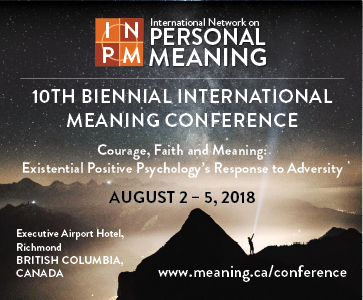
 Michael Gorman, Associate Professor of Philosophy, Catholic University of America is the author of Aquinas on the Metaphysics of the Hypostatic Union, June 2017, Cambridge University Press.
Michael Gorman, Associate Professor of Philosophy, Catholic University of America is the author of Aquinas on the Metaphysics of the Hypostatic Union, June 2017, Cambridge University Press.
 Owen Flanagan, James B. Duke Professor of Philosophy and Professor of Neurobiology at Duke University is the author of The Geography of Morals: Varieties of Moral Possibility, Oxford University Press, 2017 and co-editor of The Moral Psychology of Anger, forthcoming from Rowman and Littlefield.
Owen Flanagan, James B. Duke Professor of Philosophy and Professor of Neurobiology at Duke University is the author of The Geography of Morals: Varieties of Moral Possibility, Oxford University Press, 2017 and co-editor of The Moral Psychology of Anger, forthcoming from Rowman and Littlefield.